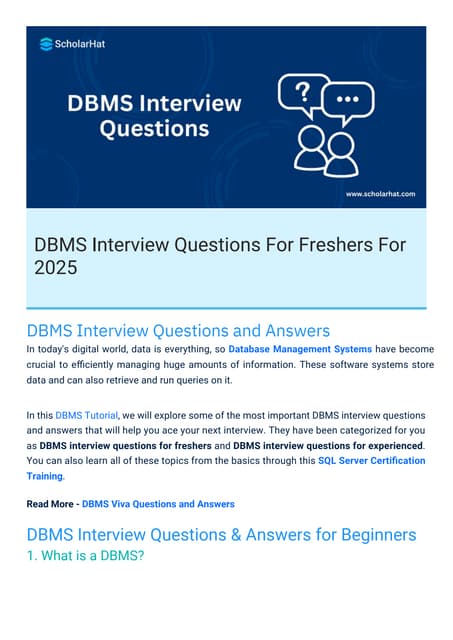2 reading is thinking
Download as PPTX, PDF0 likes285 views
This document discusses the idiom "Don't look a gift horse in the mouth" and how reading requires thinking. It explains that the idiom means it is foolish to inspect the mouth of a horse that was given to you for free. Looking in a horse's mouth allows one to determine its age and value, but inspecting a gift implies you are assessing the worth of something received freely. The document encourages readers to use vocabulary knowledge, prior knowledge, and knowledge of figurative language to understand idioms and think while reading, rather than just decoding words.
1 of 11
Downloaded 13 times




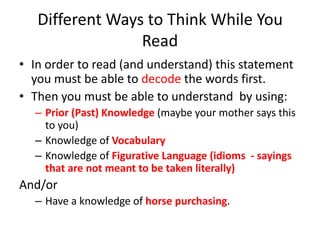





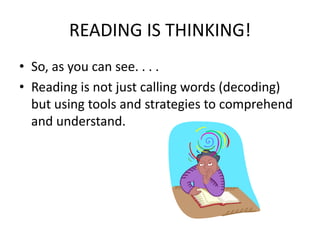
Recommended
Monday 7th jan



Monday 7th janjorawlings
Ėý
The document provides guidance and prompts for a creative writing exercise focused on vocabulary. Students will describe an object from far away and close up, using interesting vocabulary, then swap descriptions with a partner to identify words for improvement using a thesaurus. The document emphasizes writing clearly, effectively and imaginatively while engaging the reader through vocabulary choice.PLC-Word Choice



PLC-Word ChoiceHoly Trinity RCSSD #22
Ėý
a presentation on how to teach the writing trait "word choice" using Ruth Cluham's 6 +1 Traits of Writing11 Thinking is Reading Intermediate Lessons 



11 Thinking is Reading Intermediate Lessons FortheLoveofTweens
Ėý
From the Fountas and Pinnell First 20 Days of Guided Reading, these were created to help my seventh graders review key concepts of reading skills and expectations by brainstorming together and giving examples of 11 Skills:
1. Selecting Books and Creating a Successful Reading Classroom
2. Ways We Choose Books
3. Executing SSR
4. Making Good Book Choices
5. Reading Is Thinking: P.1 Mnemonics
6. Reading Is Thinking: P.2 RIT Definitions
7. Characteristics of Fiction, Nonfiction, & Poetry
8. Genres within Fiction and Nonfiction
9. Keeping a Record of Reading
10. Writing Letters About Reading
11. Writing Responses to Each Other
http://fortheloveoftweens.blogspot.com Do you have Horse Sense?



Do you have Horse Sense?BVSSslides
Ėý
This document discusses various idioms and expressions related to horses. It defines idioms such as "horse sense" meaning practical thinking, "horsepower" referring to a unit of power, "horse around" meaning play roughly, "hold your horses" meaning wait patiently, and "putting the cart before the horse" meaning doing things in the wrong order. It also explains expressions like "high horse" referring to feeling superior, "get off your high horse" meaning stop acting superior, and "straight from the horse's mouth" meaning from an authoritative source. The document encourages building vocabulary, idioms, and expressions to improve language skills.How do authors grab your attention



How do authors grab your attentionRachelle Johnson
Ėý
The document provides information about essential questions readers have when constructing meaning from text, determining important information, and how authors grab readers' attention. It discusses using text features, schema, questioning, inferring, and determining importance to state the main idea. Strategies for inferencing and determining importance are linked. Sample poems and texts are provided to demonstrate these concepts.How do authors grab your attention



How do authors grab your attentionRachelle Johnson
Ėý
The document provides information about essential questions readers have when constructing meaning from text, determining important information, and how authors grab readers' attention. It discusses using text features, schema, questioning, inferring, and determining importance to state the main idea. Strategies for inferencing and determining importance are linked. Examples of poems and texts are provided to demonstrate analyzing words, determining meanings of idioms, and identifying author's craft techniques like personification.A Good listener



A Good listenerMargo Barotta
Ėý
The document provides tips on how to be a good listener. It discusses that listening is important for gaining knowledge, cooperation from others, and strengthening relationships. Some key points about listening include spending 45% of time listening but only remembering 20% of what is heard. Poor listening styles include spacing out or pretending to listen. Genuine listening involves listening with eyes, heart and ears, standing in the other person's shoes, and mirroring what they say. Being a reflective rather than reactive listener is important.Communication training 2013 a



Communication training 2013 adouglasgreig
Ėý
'I understand you're frustrated but we need to solve this problem calmly.'
Student: 'You don't understand anything!' Chapter 2. Strategic Management: Corporate Governance.pdf



Chapter 2. Strategic Management: Corporate Governance.pdfRommel Regala
Ėý
This course provides students with a comprehensive understanding of strategic management principles, frameworks, and applications in business. It explores strategic planning, environmental analysis, corporate governance, business ethics, and sustainability. The course integrates Sustainable Development Goals (SDGs) to enhance global and ethical perspectives in decision-making.Managing expiration dates of products in odoo



Managing expiration dates of products in odooCeline George
Ėý
Odoo allows users to set expiration dates at both the product and batch levels, providing flexibility and accuracy. By using Odoo's expiration date management, companies can minimize waste, optimize stock rotation, and maintain high standards of product quality. The system allows users to set expiration dates at both the product and batch levels, providing flexibility and accuracy.Intellectual Honesty & Research Integrity.pptx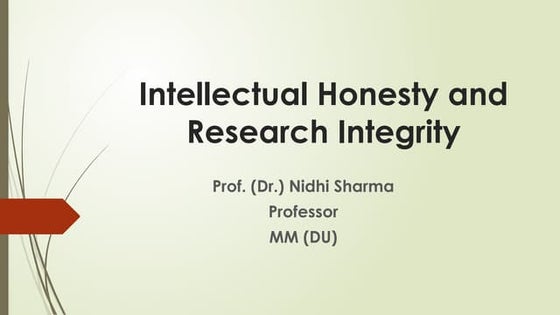



Intellectual Honesty & Research Integrity.pptxNidhiSharma495177
Ėý
Research Publication & Ethics contains a chapter on Intellectual Honesty and Research Integrity.
Different case studies of intellectual dishonesty and integrity were discussed.Full-Stack .NET Developer Interview Questions PDF By ScholarHat



Full-Stack .NET Developer Interview Questions PDF By ScholarHatScholarhat
Ėý
Full-Stack .NET Developer Interview Questions PDF By ScholarHatAzure Solution Architect Interview Questions By ScholarHat



Azure Solution Architect Interview Questions By ScholarHatScholarhat
Ėý
Azure Solution Architect Interview Questions By ScholarHatITI Turner Question Paper MCQ E-Book Free Download



ITI Turner Question Paper MCQ E-Book Free DownloadSONU HEETSON
Ėý
ITI Turner Question Paper MCQ Book PDF Free Download. All Questions collected from NIMI Mock Test, CTS Bharat Skills Question Bank, Previous Exam papers. Helpful for CTS Trade Theory 1st & 2nd Year CBT Exam,ĖýApprentice test, AITT, ISRO, DRDO, NAVY, ARMY, Naval Dockyard, Tradesman, Training Officer, Instructor, RRB ALP CBT 2,ĖýRailway Technician, CEPTAM, BRO, PWD, PHED, Air India, BHEL, BARC, IPSC, CISF, CTI, HSFC, GSRTC, GAIL, PSC, Viva, Tests, QuizĖý& all other technical competitive exams.Azure Administrator Interview Questions By ScholarHat



Azure Administrator Interview Questions By ScholarHatScholarhat
Ėý
Azure Administrator Interview Questions By ScholarHatYear 10 The Senior Phase Session 3 Term 1.pptx



Year 10 The Senior Phase Session 3 Term 1.pptxmansk2
Ėý
Year 10 The Senior Phase Session 3 Term 1.pptxRest API Interview Questions PDF By ScholarHat



Rest API Interview Questions PDF By ScholarHatScholarhat
Ėý
Rest API Interview Questions PDF By ScholarHatChapter 1. Basic Concepts of Strategic Management.pdf



Chapter 1. Basic Concepts of Strategic Management.pdfRommel Regala
Ėý
This course provides students with a comprehensive understanding of strategic management principles, frameworks, and applications in business. It explores strategic planning, environmental analysis, corporate governance, business ethics, and sustainability. The course integrates Sustainable Development Goals (SDGs) to enhance global and ethical perspectives in decision-making.How to Configure Proforma Invoice in Odoo 18 Sales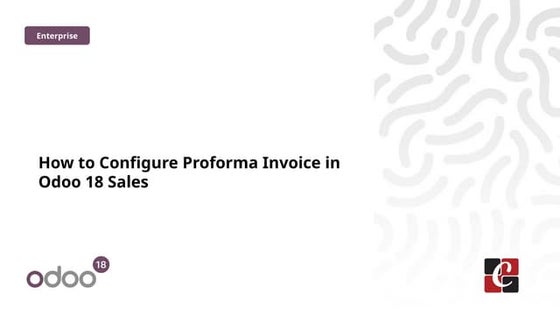



How to Configure Proforma Invoice in Odoo 18 SalesCeline George
Ėý
In this slide, weâll discuss on how to configure proforma invoice in Odoo 18 Sales module. A proforma invoice is a preliminary invoice that serves as a commercial document issued by a seller to a buyer.2024 Trend Updates: What Really Works In SEO & Content Marketing



2024 Trend Updates: What Really Works In SEO & Content MarketingSearch Engine Journal
Ėý
The future of SEO is trending toward a more human-first and user-centric approach, powered by AI intelligence and collaboration. Are you ready?
Watch as we explore which SEO trends to prioritize to achieve sustainable growth and deliver reliable results. Weâll dive into best practices to adapt your strategy around industry-wide disruptions like SGE, how to navigate the top challenges SEO professionals are facing, and proven tactics for prioritizing quality and building trust.
Youâll hear:
- The top SEO trends to prioritize in 2024 to achieve long-term success.
- Predictions for SGEâs impact, and how to adapt.
- What E-E-A-T really means, and how to implement it holistically (hint: itâs never been more important).
With Zack Kadish and Alex Carchietta, weâll show you which SEO trends to ignore and which to focus on, along with the solution to overcoming rapid, significant and disruptive Google algorithm updates.
If youâre looking to cut through the noise of constant SEO and content trends to drive success, you wonât want to miss this webinar.
Storytelling For The Web: Integrate Storytelling in your Design Process



Storytelling For The Web: Integrate Storytelling in your Design ProcessChiara Aliotta
Ėý
In this slides I explain how I have used storytelling techniques to elevate websites and brands and create memorable user experiences. You can discover practical tips as I showcase the elements of good storytelling and its applied to some examples of diverse brands/projects..More Related Content
Recently uploaded (20)
Chapter 2. Strategic Management: Corporate Governance.pdf



Chapter 2. Strategic Management: Corporate Governance.pdfRommel Regala
Ėý
This course provides students with a comprehensive understanding of strategic management principles, frameworks, and applications in business. It explores strategic planning, environmental analysis, corporate governance, business ethics, and sustainability. The course integrates Sustainable Development Goals (SDGs) to enhance global and ethical perspectives in decision-making.Managing expiration dates of products in odoo



Managing expiration dates of products in odooCeline George
Ėý
Odoo allows users to set expiration dates at both the product and batch levels, providing flexibility and accuracy. By using Odoo's expiration date management, companies can minimize waste, optimize stock rotation, and maintain high standards of product quality. The system allows users to set expiration dates at both the product and batch levels, providing flexibility and accuracy.Intellectual Honesty & Research Integrity.pptx



Intellectual Honesty & Research Integrity.pptxNidhiSharma495177
Ėý
Research Publication & Ethics contains a chapter on Intellectual Honesty and Research Integrity.
Different case studies of intellectual dishonesty and integrity were discussed.Full-Stack .NET Developer Interview Questions PDF By ScholarHat



Full-Stack .NET Developer Interview Questions PDF By ScholarHatScholarhat
Ėý
Full-Stack .NET Developer Interview Questions PDF By ScholarHatAzure Solution Architect Interview Questions By ScholarHat



Azure Solution Architect Interview Questions By ScholarHatScholarhat
Ėý
Azure Solution Architect Interview Questions By ScholarHatITI Turner Question Paper MCQ E-Book Free Download



ITI Turner Question Paper MCQ E-Book Free DownloadSONU HEETSON
Ėý
ITI Turner Question Paper MCQ Book PDF Free Download. All Questions collected from NIMI Mock Test, CTS Bharat Skills Question Bank, Previous Exam papers. Helpful for CTS Trade Theory 1st & 2nd Year CBT Exam,ĖýApprentice test, AITT, ISRO, DRDO, NAVY, ARMY, Naval Dockyard, Tradesman, Training Officer, Instructor, RRB ALP CBT 2,ĖýRailway Technician, CEPTAM, BRO, PWD, PHED, Air India, BHEL, BARC, IPSC, CISF, CTI, HSFC, GSRTC, GAIL, PSC, Viva, Tests, QuizĖý& all other technical competitive exams.Azure Administrator Interview Questions By ScholarHat



Azure Administrator Interview Questions By ScholarHatScholarhat
Ėý
Azure Administrator Interview Questions By ScholarHatYear 10 The Senior Phase Session 3 Term 1.pptx



Year 10 The Senior Phase Session 3 Term 1.pptxmansk2
Ėý
Year 10 The Senior Phase Session 3 Term 1.pptxRest API Interview Questions PDF By ScholarHat



Rest API Interview Questions PDF By ScholarHatScholarhat
Ėý
Rest API Interview Questions PDF By ScholarHatChapter 1. Basic Concepts of Strategic Management.pdf



Chapter 1. Basic Concepts of Strategic Management.pdfRommel Regala
Ėý
This course provides students with a comprehensive understanding of strategic management principles, frameworks, and applications in business. It explores strategic planning, environmental analysis, corporate governance, business ethics, and sustainability. The course integrates Sustainable Development Goals (SDGs) to enhance global and ethical perspectives in decision-making.How to Configure Proforma Invoice in Odoo 18 Sales



How to Configure Proforma Invoice in Odoo 18 SalesCeline George
Ėý
In this slide, weâll discuss on how to configure proforma invoice in Odoo 18 Sales module. A proforma invoice is a preliminary invoice that serves as a commercial document issued by a seller to a buyer.Featured (20)
2024 Trend Updates: What Really Works In SEO & Content Marketing



2024 Trend Updates: What Really Works In SEO & Content MarketingSearch Engine Journal
Ėý
The future of SEO is trending toward a more human-first and user-centric approach, powered by AI intelligence and collaboration. Are you ready?
Watch as we explore which SEO trends to prioritize to achieve sustainable growth and deliver reliable results. Weâll dive into best practices to adapt your strategy around industry-wide disruptions like SGE, how to navigate the top challenges SEO professionals are facing, and proven tactics for prioritizing quality and building trust.
Youâll hear:
- The top SEO trends to prioritize in 2024 to achieve long-term success.
- Predictions for SGEâs impact, and how to adapt.
- What E-E-A-T really means, and how to implement it holistically (hint: itâs never been more important).
With Zack Kadish and Alex Carchietta, weâll show you which SEO trends to ignore and which to focus on, along with the solution to overcoming rapid, significant and disruptive Google algorithm updates.
If youâre looking to cut through the noise of constant SEO and content trends to drive success, you wonât want to miss this webinar.
Storytelling For The Web: Integrate Storytelling in your Design Process



Storytelling For The Web: Integrate Storytelling in your Design ProcessChiara Aliotta
Ėý
In this slides I explain how I have used storytelling techniques to elevate websites and brands and create memorable user experiences. You can discover practical tips as I showcase the elements of good storytelling and its applied to some examples of diverse brands/projects..Artificial Intelligence, Data and Competition â SCHREPEL â June 2024 OECD dis...



Artificial Intelligence, Data and Competition â SCHREPEL â June 2024 OECD dis...OECD Directorate for Financial and Enterprise Affairs
Ėý
This presentation by Thibault Schrepel, Associate Professor of Law at Vrije Universiteit Amsterdam University, was made during the discussion âArtificial Intelligence, Data and Competitionâ held at the 143rd meeting of the OECD Competition Committee on 12 June 2024. More papers and presentations on the topic can be found at oe.cd/aicomp.
This presentation was uploaded with the authorâs consent.
How to Leverage AI to Boost Employee Wellness - Lydia Di Francesco - SocialHR...



How to Leverage AI to Boost Employee Wellness - Lydia Di Francesco - SocialHR...SocialHRCamp
Ėý
Speaker: Lydia Di Francesco
In this workshop, participants will delve into the realm of AI and its profound potential to revolutionize employee wellness initiatives. From stress management to fostering work-life harmony, AI offers a myriad of innovative tools and strategies that can significantly enhance the wellbeing of employees in any organization. Attendees will learn how to effectively leverage AI technologies to cultivate a healthier, happier, and more productive workforce. Whether it's utilizing AI-powered chatbots for mental health support, implementing data analytics to identify internal, systemic risk factors, or deploying personalized wellness apps, this workshop will equip participants with actionable insights and best practices to harness the power of AI for boosting employee wellness. Join us and discover how AI can be a strategic partner towards a culture of wellbeing and resilience in the workplace.2024 State of Marketing Report â by Hubspot



2024 State of Marketing Report â by HubspotMarius Sescu
Ėý
https://www.hubspot.com/state-of-marketing
· Scaling relationships and proving ROI
· Social media is the place for search, sales, and service
· Authentic influencer partnerships fuel brand growth
· The strongest connections happen via call, click, chat, and camera.
· Time saved with AI leads to more creative work
· Seeking: A single source of truth
· TLDR; Get on social, try AI, and align your systems.
· More human marketing, powered by robotsEverything You Need To Know About ChatGPT



Everything You Need To Know About ChatGPTExpeed Software
Ėý
ChatGPT is a revolutionary addition to the world since its introduction in 2022. A big shift in the sector of information gathering and processing happened because of this chatbot. What is the story of ChatGPT? How is the bot responding to prompts and generating contents? Swipe through these slides prepared by Expeed Software, a web development company regarding the development and technical intricacies of ChatGPT!Product Design Trends in 2024 | Teenage Engineerings



Product Design Trends in 2024 | Teenage EngineeringsPixeldarts
Ėý
The realm of product design is a constantly changing environment where technology and style intersect. Every year introduces fresh challenges and exciting trends that mold the future of this captivating art form. In this piece, we delve into the significant trends set to influence the look and functionality of product design in the year 2024.How Race, Age and Gender Shape Attitudes Towards Mental Health



How Race, Age and Gender Shape Attitudes Towards Mental HealthThinkNow
Ėý
Mental health has been in the news quite a bit lately. Dozens of U.S. states are currently suing Meta for contributing to the youth mental health crisis by inserting addictive features into their products, while the U.S. Surgeon General is touring the nation to bring awareness to the growing epidemic of loneliness and isolation. The country has endured periods of low national morale, such as in the 1970s when high inflation and the energy crisis worsened public sentiment following the Vietnam War. The current mood, however, feels different. Gallup recently reported that national mental health is at an all-time low, with few bright spots to lift spirits.
To better understand how Americans are feeling and their attitudes towards mental health in general, ThinkNow conducted a nationally representative quantitative survey of 1,500 respondents and found some interesting differences among ethnic, age and gender groups.
Technology
For example, 52% agree that technology and social media have a negative impact on mental health, but when broken out by race, 61% of Whites felt technology had a negative effect, and only 48% of Hispanics thought it did.
While technology has helped us keep in touch with friends and family in faraway places, it appears to have degraded our ability to connect in person. Staying connected online is a double-edged sword since the same news feed that brings us pictures of the grandkids and fluffy kittens also feeds us news about the wars in Israel and Ukraine, the dysfunction in Washington, the latest mass shooting and the climate crisis.
Hispanics may have a built-in defense against the isolation technology breeds, owing to their large, multigenerational households, strong social support systems, and tendency to use social media to stay connected with relatives abroad.
Age and Gender
When asked how individuals rate their mental health, men rate it higher than women by 11 percentage points, and Baby Boomers rank it highest at 83%, saying itâs good or excellent vs. 57% of Gen Z saying the same.
Gen Z spends the most amount of time on social media, so the notion that social media negatively affects mental health appears to be correlated. Unfortunately, Gen Z is also the generation thatâs least comfortable discussing mental health concerns with healthcare professionals. Only 40% of them state theyâre comfortable discussing their issues with a professional compared to 60% of Millennials and 65% of Boomers.
Race Affects Attitudes
As seen in previous research conducted by ThinkNow, Asian Americans lag other groups when it comes to awareness of mental health issues. Twenty-four percent of Asian Americans believe that having a mental health issue is a sign of weakness compared to the 16% average for all groups. Asians are also considerably less likely to be aware of mental health services in their communities (42% vs. 55%) and most likely to seek out information on social media (51% vs. 35%).AI Trends in Creative Operations 2024 by Artwork Flow.pdf



AI Trends in Creative Operations 2024 by Artwork Flow.pdfmarketingartwork
Ėý
Creative operations teams expect increased AI use in 2024. Currently, over half of tasks are not AI-enabled, but this is expected to decrease in the coming year. ChatGPT is the most popular AI tool currently. Business leaders are more actively exploring AI benefits than individual contributors. Most respondents do not believe AI will impact workforce size in 2024. However, some inhibitions still exist around AI accuracy and lack of understanding. Creatives primarily want to use AI to save time on mundane tasks and boost productivity.Skeleton Culture Code



Skeleton Culture CodeSkeleton Technologies
Ėý
Organizational culture includes values, norms, systems, symbols, language, assumptions, beliefs, and habits that influence employee behaviors and how people interpret those behaviors. It is important because culture can help or hinder a company's success. Some key aspects of Netflix's culture that help it achieve results include hiring smartly so every position has stars, focusing on attitude over just aptitude, and having a strict policy against peacocks, whiners, and jerks.PEPSICO Presentation to CAGNY Conference Feb 2024



PEPSICO Presentation to CAGNY Conference Feb 2024Neil Kimberley
Ėý
PepsiCo provided a safe harbor statement noting that any forward-looking statements are based on currently available information and are subject to risks and uncertainties. It also provided information on non-GAAP measures and directing readers to its website for disclosure and reconciliation. The document then discussed PepsiCo's business overview, including that it is a global beverage and convenient food company with iconic brands, $91 billion in net revenue in 2023, and nearly $14 billion in core operating profit. It operates through a divisional structure with a focus on local consumers.Content Methodology: A Best Practices Report (Webinar)



Content Methodology: A Best Practices Report (Webinar)contently
Ėý
This document provides an overview of content methodology best practices. It defines content methodology as establishing objectives, KPIs, and a culture of continuous learning and iteration. An effective methodology focuses on connecting with audiences, creating optimal content, and optimizing processes. It also discusses why a methodology is needed due to the competitive landscape, proliferation of channels, and opportunities for improvement. Components of an effective methodology include defining objectives and KPIs, audience analysis, identifying opportunities, and evaluating resources. The document concludes with recommendations around creating a content plan, testing and optimizing content over 90 days.How to Prepare For a Successful Job Search for 2024



How to Prepare For a Successful Job Search for 2024Albert Qian
Ėý
The document provides guidance on preparing a job search for 2024. It discusses the state of the job market, focusing on growth in AI and healthcare but also continued layoffs. It recommends figuring out what you want to do by researching interests and skills, then conducting informational interviews. The job search should involve building a personal brand on LinkedIn, actively applying to jobs, tailoring resumes and interviews, maintaining job hunting as a habit, and continuing self-improvement. Once hired, the document advises setting new goals and keeping skills and networking active in case of future opportunities.Social Media Marketing Trends 2024 // The Global Indie Insights



Social Media Marketing Trends 2024 // The Global Indie InsightsKurio // The Social Media Age(ncy)
Ėý
A report by thenetworkone and Kurio.
The contributing experts and agencies are (in an alphabetical order): Sylwia Rytel, Social Media Supervisor, 180heartbeats + JUNG v MATT (PL), Sharlene Jenner, Vice President - Director of Engagement Strategy, Abelson Taylor (USA), Alex Casanovas, Digital Director, Atrevia (ES), Dora Beilin, Senior Social Strategist, Barrett Hoffher (USA), Min Seo, Campaign Director, Brand New Agency (KR), DeshÃĐ M. Gully, Associate Strategist, Day One Agency (USA), Francesca Trevisan, Strategist, Different (IT), Trevor Crossman, CX and Digital Transformation Director; Olivia Hussey, Strategic Planner; Simi Srinarula, Social Media Manager, The Hallway (AUS), James Hebbert, Managing Director, Hylink (CN / UK), Mundy Ãlvarez, Planning Director; Pedro Rojas, Social Media Manager; Pancho GonzÃĄlez, CCO, Inbrax (CH), Oana Oprea, Head of Digital Planning, Jam Session Agency (RO), Amy Bottrill, Social Account Director, Launch (UK), Gaby Arriaga, Founder, Leonardo1452 (MX), Shantesh S Row, Creative Director, Liwa (UAE), Rajesh Mehta, Chief Strategy Officer; Dhruv Gaur, Digital Planning Lead; Leonie Mergulhao, Account Supervisor - Social Media & PR, Medulla (IN), Aurelija PlioplytÄ, Head of Digital & Social, Not Perfect (LI), Daiana Khaidargaliyeva, Account Manager, Osaka Labs (UK / USA), Stefanie SoĖhnchen, Vice President Digital, PIABO Communications (DE), Elisabeth Winiartati, Managing Consultant, Head of Global Integrated Communications; Lydia Aprina, Account Manager, Integrated Marketing and Communications; Nita Prabowo, Account Manager, Integrated Marketing and Communications; Okhi, Web Developer, PNTR Group (ID), Kei Obusan, Insights Director; Daffi Ranandi, Insights Manager, Radarr (SG), Gautam Reghunath, Co-founder & CEO, Talented (IN), Donagh Humphreys, Head of Social and Digital Innovation, THINKHOUSE (IRE), Sarah Yim, Strategy Director, Zulu Alpha Kilo (CA).Trends In Paid Search: Navigating The Digital Landscape In 2024



Trends In Paid Search: Navigating The Digital Landscape In 2024Search Engine Journal
Ėý
The search marketing landscape is evolving rapidly with new technologies, and professionals, like you, rely on innovative paid search strategies to meet changing demands.
Itâs important that youâre ready to implement new strategies in 2024.
Check this out and learn the top trends in paid search advertising that are expected to gain traction, so you can drive higher ROI more efficiently in 2024.
Youâll learn:
- The latest trends in AI and automation, and what this means for an evolving paid search ecosystem.
- New developments in privacy and data regulation.
- Emerging ad formats that are expected to make an impact next year.
Watch Sreekant Lanka from iQuanti and Irina Klein from OneMain Financial as they dive into the future of paid search and explore the trends, strategies, and technologies that will shape the search marketing landscape.
If youâre looking to assess your paid search strategy and design an industry-aligned plan for 2024, then this webinar is for you.5 Public speaking tips from TED - Visualized summary



5 Public speaking tips from TED - Visualized summarySpeakerHub
Ėý
From their humble beginnings in 1984, TED has grown into the worldâs most powerful amplifier for speakers and thought-leaders to share their ideas. They have over 2,400 filmed talks (not including the 30,000+ TEDx videos) freely available online, and have hosted over 17,500 events around the world.
With over one billion views in a year, itâs no wonder that so many speakers are looking to TED for ideas on how to share their message more effectively.
The article â5 Public-Speaking Tips TED Gives Its Speakersâ, by Carmine Gallo for Forbes, gives speakers five practical ways to connect with their audience, and effectively share their ideas on stage.
Whether you are gearing up to get on a TED stage yourself, or just want to master the skills that so many of their speakers possess, these tips and quotes from Chris Anderson, the TED Talks Curator, will encourage you to make the most impactful impression on your audience.
See the full article and more summaries like this on SpeakerHub here: https://speakerhub.com/blog/5-presentation-tips-ted-gives-its-speakers
See the original article on Forbes here:
http://www.forbes.com/forbes/welcome/?toURL=http://www.forbes.com/sites/carminegallo/2016/05/06/5-public-speaking-tips-ted-gives-its-speakers/&refURL=&referrer=#5c07a8221d9bChatGPT and the Future of Work - Clark Boyd 



ChatGPT and the Future of Work - Clark Boyd Clark Boyd
Ėý
Everyone is in agreement that ChatGPT (and other generative AI tools) will shape the future of work. Yet there is little consensus on exactly how, when, and to what extent this technology will change our world.
Businesses that extract maximum value from ChatGPT will use it as a collaborative tool for everything from brainstorming to technical maintenance.
For individuals, now is the time to pinpoint the skills the future professional will need to thrive in the AI age.
Check out this presentation to understand what ChatGPT is, how it will shape the future of work, and how you can prepare to take advantage. Getting into the tech field. what next 



Getting into the tech field. what next Tessa Mero
Ėý
The document provides career advice for getting into the tech field, including:
- Doing projects and internships in college to build a portfolio.
- Learning about different roles and technologies through industry research.
- Contributing to open source projects to build experience and network.
- Developing a personal brand through a website and social media presence.
- Networking through events, communities, and finding a mentor.
- Practicing interviews through mock interviews and whiteboarding coding questions.Google's Just Not That Into You: Understanding Core Updates & Search Intent



Google's Just Not That Into You: Understanding Core Updates & Search IntentLily Ray
Ėý
1. Core updates from Google periodically change how its algorithms assess and rank websites and pages. This can impact rankings through shifts in user intent, site quality issues being caught up to, world events influencing queries, and overhauls to search like the E-A-T framework.
2. There are many possible user intents beyond just transactional, navigational and informational. Identifying intent shifts is important during core updates. Sites may need to optimize for new intents through different content types and sections.
3. Responding effectively to core updates requires analyzing "before and after" data to understand changes, identifying new intents or page types, and ensuring content matches appropriate intents across video, images, knowledge graphs and more.How to have difficult conversations 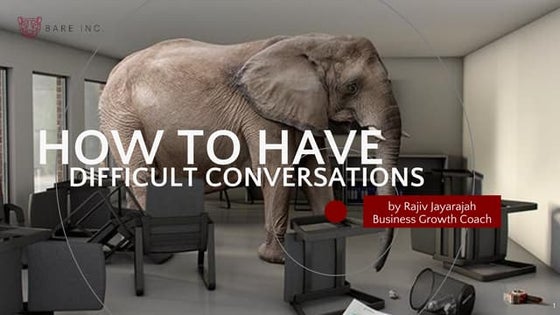



How to have difficult conversations Rajiv Jayarajah, MAppComm, ACC
Ėý
Stop putting off having difficult conversations. Seven practical tips to ensure your next difficult conversation go smoothly. Artificial Intelligence, Data and Competition â SCHREPEL â June 2024 OECD dis...



Artificial Intelligence, Data and Competition â SCHREPEL â June 2024 OECD dis...OECD Directorate for Financial and Enterprise Affairs
Ėý
2 reading is thinking
- 1. READING IS THINKING! Try this!
- 2. It is considered to be extremely injudicious to Investigate with extreme care the oral cavity of an Equus which has been provided to one gratis. Say What???
- 3. âĒ Donât Look a Gift Horse in the Mouth.
- 4. Say what? It is very foolish look in the mouth of a horse which has been given to you free.
- 5. Different Ways to Think While You Read âĒ In order to read (and understand) this statement you must be able to decode the words first. âĒ Then you must be able to understand by using: â Prior (Past) Knowledge (maybe your mother says this to you) â Knowledge of Vocabulary â Knowledge of Figurative Language (idioms - sayings that are not meant to be taken literally) And/or â Have a knowledge of horse purchasing.
- 6. So âĶUsing Vocabulary Knowledge It is considered to be extremely injudicious (foolish) to Investigate with extreme care the oral cavity (mouth) of an Equus (horse) which has been provided to one gratis (free).
- 7. Prior Knowledge or Knowledge of Horse Purchasing âĒ Something like this: âĒ the value of a horse is related it its age - i.e., a younger horse is more valuable than an older horse. âĒ You can determine the relative age of a horse by inspecting its teeth. âĒ So What????
- 8. Back in the day, âĒ a horse was commonly given as a gift. âĒ If a man received a horse as a gift, and then inspected inside its mouth, he was trying to assess the value of the gift he received.
- 9. The saying means âĒ that you should not assess the value of any gift that you receive; rather you should be thankful for the thoughtfulness of the gift-giver.
- 10. Or in other words: Donât complain about a gift.
- 11. READING IS THINKING! âĒ So, as you can see. . . . âĒ Reading is not just calling words (decoding) but using tools and strategies to comprehend and understand.



